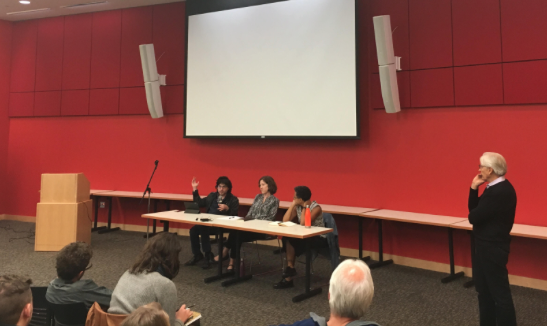Can a universal basic income work? Experts weigh in
The concept is gaining traction across the political spectrum

More stories from Bryan Bowman

A panel gathers in the Commonwealth Honors College to discuss UBI.
AMHERST — The College of Social and Behavioral Sciences held a panel discussion on universal basic income (UBI) in the Commonwealth Honors College Events Hall at the University of Massachusetts Amherst on Monday.
While UBI proposals vary significantly, the basic concept is that every adult would receive a basic level of income each year directly from the government, just by virtue of being a citizen.
The panel included Connie Razza, the co-director of policy and research at Demos, a public policy organization, and Seth Ackerman, a member of the editorial board at Jacobin magazine, which describes itself as “a leading voice of the American left offering socialist perspectives on politics.” Elizabeth Rhodes, a research director for the Basic Income Project at Y Combinator Research, was the third member of the panel.
The discussion was moderated by Nicholas Xenos, a professor of political science at UMass.
Proponents of UBI believe it could be a powerful tool in mitigating the potentially massive economic upheaval that technological advancements in robotics and artificial intelligence threaten to cause in the coming years.
One well-cited 2013 study from Oxford University estimated that as many as 47 percent of American jobs could be replaced by automation in the next 10 to 20 years. According to experts, entire industries such as truck driving, cashiering and manufacturing could conceivably be taken over by robots and computers in coming decades.
With the threat of automation looming, the concept of universal basic income is increasingly gaining traction across the political spectrum, both in the United States and around the world.
Xenos framed the discussion by explaining that forms of UBI have been proposed by liberals and conservatives alike throughout history. According to Xenos, renowned conservative economist Milton Friedman and Martin Luther King Jr. were both supporters of the concept of UBI, despite major differences in their economic ideologies.
According to Xenos, UBI has recently garnered support from people ranging from libertarian conservatives like political scientist Charles Murray, to Silicon Valley giants Elon Musk and Mark Zuckerberg, to progressive leftists and socialists.
Ackerman said that this intellectual diversity amongst UBI supporters was one of the first things that stood out to him when he began researching the subject.
“A really interesting thing about UBI is that it’s advocated for by groups of people on absolutely opposite ends of the political spectrum, with very different types of visions about its purpose,” he said.
Ackerman explained that UBI is attractive to anti-poverty activists because it ensures a basic level of welfare for the poorest individuals without providing disincentives to work.
“Under a traditional welfare system, if you start working and your income rises above some threshold, then you lose those benefits…one of the main attractions of [UBI] is that it doesn’t have that anti-work incentive because you get the same check either way,” Ackerman said.
Ackerman said that the unconditional nature of a UBI system is also attractive to anti-poverty activists for another reason.
“Because [UBI] is unconditional, it eliminates one of the most unpleasant aspects of a welfare system, which is that it can be extremely intrusive and humiliating for the beneficiaries,” Ackerman said. “Most welfare programs are conditional, you have to demonstrate you need it. You have to meet all kinds of criteria, you have to show up to a welfare office and talk to bureaucrats who are forced to be extremely intrusive.”
While free money for everybody may seem like a radically liberal idea, Ackerman explained why the concept is surprisingly being supported by some conservatives as well.
“UBI has been attractive to many free-market, libertarian-type conservatives like Charles Murray, because they recognize that at some basic level, it’s not feasible and it’s not desirable to let people starve … So many of them view UBI as extremely attractive because it eliminates the disincentives to work,” he said.
Ackerman said that a UBI system could also eliminate a lot of bureaucracy associated with welfare programs, which would please conservatives who want smaller government.
“You don’t really need much of a bureaucracy with UBI, you just send out a check,” he said.
According to Ackerman, there is one critical distinction between liberal and conservative UBI proposals. While liberals would generally like to see UBI complement existing welfare programs like social security, medicaid and food stamps, conservatives see UBI as a replacement for these programs.
That’s why Razza believes that even if liberals and conservatives agree conceptually about UBI, it’s important to pay attention to who would be implementing the system.
“It’s about power. Earlier in a smaller conversation we were talking about what happens to the shape and the impact of UBI depending on who’s involved in formulating it,” Razza said.
Razza argued that in order for a UBI system to be effective, it would have to involve activists on the grassroots level and part of a broader “robust social safety net,” not a “wholesale replacement” of other welfare programs.
While the goal of UBI is to create a more stable and equitable society, Razza warned that money alone cannot address all aspects of social inequality.
“The history of race and of racial inequality in the United States is so deep that there is no amount of money, as far as I’m concerned, that will make up for the breadth of challenge people of color face,” Razza said.
Rhodes also warned that UBI isn’t a “silver bullet” that will magically solve all of society’s problems.
“UBI isn’t a solution, it’s a foundation,” Rhodes said. “Nor is UBI an adequate replacement for work. But I think what we’re seeing is that it has the potential to redefine the meaning of work.”
In 2018, Rhodes and her team at the Basic Income Project will launch a large-scale study to explore the implications of UBI. The study will involve 3,000 people in two states. Half of the participants will receive $1,000 per month for three years, and the team will compare the financial, physical and emotional health of the two groups to try to gauge the impact that a wide-scale UBI system could have on individuals and society.
While UBI is gaining traction on both sides of the political spectrum, particularly in light of the growing threat of automation, Razza also warned that a broad cultural shift would likely be necessary before a UBI system could be adopted in America.
“A successful UBI program really depends on pretty dramatic culture change here. Right now I think the United States is really committed to the notion of individualism. Individuals work hard and they get what they get. So it would require a dramatic change for us to have a society where folks were really willing to contribute to the collective good,” Razza said.
Email Bryan at bbowman@umass.edu or follow him on Twitter @bryanbowman14.
